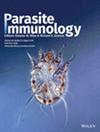Murine immune responses to Schistosoma haematobium and the vaccine candidate rSh28GST
IF 2.1
4区 医学
Q4 IMMUNOLOGY
引用次数: 0
Abstract
SUMMARY小鼠对血吸虫和候选疫苗 rSh28GST 的免疫反应
摘要对 CBA 小鼠血吸虫感染的纵向研究表明,细胞免疫反应逐渐下调,这是由体外淋巴细胞培养的有丝分裂原和抗原刺激测定的。脾细胞在抗原刺激下产生的 Th1 细胞因子 IFN-γ 在感染后 14 周内(寄生虫产卵开始后四周)逐渐增加,随后迅速下降。相同培养物中 Th2 细胞因子 IL-4 的水平在 14 周前一直较低,之后随着 IFN-γ 的下降而迅速升高。IL-10的高水平与IFN-γ产生的高峰相吻合,表明这种细胞因子的作用不受Th2限制。总免疫球蛋白和抗原特异性免疫球蛋白的产生证实寄生虫卵沉积是宿主体液反应的主要刺激因素。烟粉虱感染未能引起抗繁殖力候选疫苗 rSh28GST 可检测到的 T 细胞反应。然而,在受感染的小鼠血清中可检测到低水平的抗体,接种 rSh28GST 加佐剂疫苗可诱导产生强 IgG 和 IgA。
本文章由计算机程序翻译,如有差异,请以英文原文为准。
求助全文
约1分钟内获得全文
求助全文
来源期刊

Parasite Immunology
医学-寄生虫学
CiteScore
4.70
自引率
4.50%
发文量
61
审稿时长
6-12 weeks
期刊介绍:
Parasite Immunology is an international journal devoted to research on all aspects of parasite immunology in human and animal hosts. Emphasis has been placed on how hosts control parasites, and the immunopathological reactions which take place in the course of parasitic infections. The Journal welcomes original work on all parasites, particularly human parasitology, helminths, protozoa and ectoparasites.
 求助内容:
求助内容: 应助结果提醒方式:
应助结果提醒方式:


